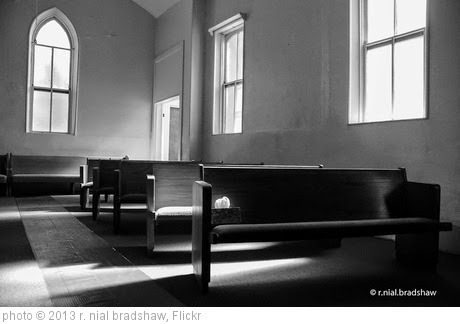Rachel Held Evans's Blog, page 21
May 18, 2014
Sunday Superlatives 5/18/14
Coolest:
Alex Chacon with “Around the World in 360° Degrees - 3 Year Epic Selfie”
Bravest:
Michael Gungor with “Lucette”
“So I took out my phone and googled Psalm 139. I placed my hand on Lisa’s belly and read: “You created her inmost being.” That phrase unearthed a new reservoir of tears for both Lisa and I. It took a long time before I could gain composure to continue reading. But eventually the words washed over us like a waterfall.”
Wisest:
Jamie Wright with “Not all pastor’s kids are Christian. Sorry.”
“We are so incredibly proud of the bright, thoughtful, courageous heathens we're raising. And while, as Christian parents, we cling to certain hopes and dreams for our children's faith and future, we trust that the God we believe in is near to them, fully present, and doing His thing.”
Most Powerful:
Sarah Bessey and Work of the People with “You Are Not Forgotten”
Most Profound:
Daniel José Camacho quoting Brian Bantum in “Institutions need to be Born Again (a theology of institutional inclusion)”
“…In this baptismal moment there also lies the profound transformation of the community, for with every new member comes the possibility of transformation, change, and adaptation in its inclusion not only for the one welcomed, but for those who welcome. The body of Christ shifts and moves and learns new languages as it adds new members. Its body becomes new as the person becomes new. This transformation is not without shape or purpose. It is a body that recognizes it exists within that in which all difference is found.”
Most Surprising:
Dale Best wtih "My Experience at the First Taping of the Rob Bell Show"
“In the first two episode of his new show on OWN, Bell is challenging the audience to see the divine spark that God wired within each human being and to consider the Cross of Jesus. Think about that for a second.”
Most Enlightening:
Shawna at Not the Former Things with “When Church Hurts”
“For my son, the sensory experience of going to church is something similar to torture (I wish I was exaggerating to make a point). He enters the crowded lobby with wall to wall people, everyone talking at the same time, various smells of babies and coffee and muffins and perfume, getting bumped here and there because it’s not time for the service to start, people still talking and welcoming and trying to hang on to their children as they run for the donuts and other children…”
Most Informative:
Bob Smietana at On Faith with “Are Millennials Really Leaving the Church? Yes – but Mostly White Millennials”
“About a third of young (18-29 year old) Americans — and more than half of younger Christians — are people of color, according to data from the Public Religion Research Institute. White Christians, on the other hand, make up only a quarter of younger Americans. In fact there are more Nones — those with no religion — than white Christians in this age group. ‘What you have in American religion today are the nonwhite Christians and the Nones,’ says Mark Silk, professor of Religion in Public Life at Trinity College in Hartford, Connecticut.”
Most Inspiring:
Zadie Smith with “Storytelling is a Magical, Ruthless Discipline”
“Sometimes I think my whole professional life has been based on this hunch I had, early on, that many people feel just as muddled as I do, and might be happy to tag along with me on this search for clarity, for precision.”
Most Beautiful:
God Our Mother by the Liturgists
Most Challenging:
Ruthie Johnson with “Diversity in the Church is Essential to God’s Mission”
“Because of division, we forget that God’s heart is inclusive. We forget that God’s identity is expressed in diversity. When we start to look for God’s identity, we can start to ask, ‘Who’s not in the room?’ When we pursue diversity, we start to understand that God calls us into a ‘belonging’- a restoration of this division. God does this through an expression of his fullness.”
Best Response:
Mimi Haddad with “Bait and Switch Complementarians”
“Please do not tell girls or women that they share equally in God’s image; that they are equal at the foot of the cross; that they are equal in the kingdom of God, that they should cultivate their minds equally, unless you are prepared to give them equal authority to use the gifts God has given them. To do otherwise is to bait girls and women with the truth of Scripture as it points to their inheritance in Christ, and then to switch—to deny them the opportunities to walk in newness of life—in using their God-given gifts with equality authority.”
Best Perspective:
Pamela Erens with “The Joys of Trimming”
“I rarely find getting rid of my words to be an emotional trial. On the contrary, when I can remove a limp adjective or superfluous sentence from a novel chapter or essay, I feel a rush that is a bit like being airborne. For every word I cut, I seem to have more space between my ribs, more lung capacity. I feel simpler and calmer, my head pleasantly lighter. And later, when I turn my work over to an editor, he or she is bound to make some more deletions. I love editors who get rid of things.”
Best Observation:
John Hawthorne with “Testimony Evangelicalism”
On the Blog…“The most powerful pieces we read on the internet are not systematic explications of how this and such worked together. They are painful moments of real life: the miscarriage experienced by a young couple, the struggle another couple had with infertility, the sometimes crippling nature of depression, the happy couple in their first apartment, the birth of a grandchild, the completion of a doctorate. And in the midst of all that is faith. Not a blind faith that says “God has a plan” but one that says that God is present in the struggle and the joy and the accomplishment. Testimony of that sort can change the world. Testimonial Evangelicalism is trying to Bear Witness.”
Most Popular Post:
3 Things You Might Not Know About Proverbs 31
“Too often, we focus on the Proverbs 31 Woman’s roles as a way of reducing womanhood to marriage, motherhood, and domesticity, when really, this passage is about character that transcends both gender and circumstance.”
Most Popular Comments:
In response to “It’s Not About Conforming to the World,” Billy wrote:
Thank you for this. I must confess (sadly) that I find myself often reading your posts hoping that you will change your mind on some things while neglecting my own areas of confusion or uncertainty regarding some issues within the church. While I am not the type to publicly argue or slander, I have often (in my mind) devalued you and others as brothers and sisters as well as image bearers solely because I disagree. I am sincerely sorry for that. I can only hope that all of us who love Jesus and seek to make him known will come to a place of agreement on the things that matter, and hold those things up together, while letting the other things be left up for discussions that are filled with grace and humility. Thanks again.
And in response to “Is God a Man? (a brief response to CBMW’s heresy accusation)”, Paul wrote:
“Disputes like this make me think we need to retire the word "heresy" from contemporary discourse, reserving it strictly for historical descriptions of beliefs that the church formally condemned (rightly or wrongly) as actual heresies. The word is overused and freighted with such baggage that it no longer carries any real meaning. For example, what is Strachan intending by using the "h-word" here? None of the creeds or councils describe the gender of God, nor does the Bible reject the use of feminine imagery in describing God. So it seems he misapplies it, thus robbing it of the meaning he presumably would like it to have and making it less likely that future use of the word will carry much, if any, weight.
That's assuming it has any weight anymore. I hear "heresy" used in a joking manner more than a serious one, as most younger Christians have been so inundated by the word to refer to any deviation from "traditional" (read: conservative) Christianity that they are inoculated from the possibility that heresy is a real and dangerous thing to avoid. It is certainly an effective power play to describe someone as a heretic; the church has done it now for thousands of years. Unfortunately, as with most power plays, the word is here being used by the powerful (a man) against the traditionally marginalized (a woman), defending a "doctrine" that perpetuates patriarchal oppression. One could look at the Bible and perhaps reach the conclusion that using one's religious beliefs as a cudgel with which to hammer the marginalized is ... well, somewhat heretical.”
Paul will be happy to know that tomorrow I’ll be featuring an interview with Justin Holcomb, who has written a book on this very topic! So stay tuned!
***
So, what caught your eye online this week? What’s happening on your blog?



May 16, 2014
Is God a man? (a brief response to CBMW’s accusation of heresy)

"You saw no form of any kind the day the Lord spoke to you at Horeb out of the fire. Therefore watch yourselves very carefully, so that you do not become corrupt and make for yourselves an idol, an image of any shape, whether formed like a man or a woman, or like any animal on earth or any bird that flies in the air…”
- Deuteronomy 4:15-17
Back in 2012, I wrote a post for Holy Week about Mary’s experience during the crucifixion. At the end of the post, I refer to God as She. I believe it’s the only time in any of my published writing I have done so, as I typically avoid gendered pronouns when writing about God or simply refer to God as He.
Well today Owen Strachan, president of the Council on Biblical Manhood and Womanhood, took to twitter to declare the post heresy. (It’s unclear to me why it’s only just now coming up.) It’s no small thing to be named a heretic by someone in a position of Christian leadership, and the tweet has already given rise to all sorts of crazy rumors, so I figured a brief response might be warranted.
First, I wholeheartedly affirm the Apostle’s and Nicene Creeds and I believe Scripture to be inspired by God and authoritative in the Christian life. Like Owen, I believe in the good news that Jesus Christ is Lord and would gladly join him in proclaiming the great mystery of the faith—that Christ has died, Christ has risen, and Christ will come again. I disagree with Owen that differences in theology regarding gender are matters of orthodoxy, particularly given the number of faithful Christians who have disagreed on these issues through the centuries, and I’m disappointed he resorted to charges of heresy when we should be able to discuss these differences with gentleness and respect. (As luck would have it, next week we’re slated to host an interview with Justin Holcomb who has written a whole book on heresy, so this conversation should get even more interesting!)
Second, I believe Scripture teaches that both men and women are created in the image of God (Genesis 1:27), which means both masculinity and femininity are - at some level - part of God’s nature. Scripture often uses feminine imagery to describe God as a mother, nurse, seamstress, midwife, etc. (Ruth 2:12, Ps. 17:8, Matt. 23:37, Isa. 46: 3-4, Job 38: 29, Hos. 11:3-4, Ps. 22:9, Luke 13:20–21, Luke 15:8-9), and while God is often referred to as Father, and Jesus was certainly a man, the Hebrew word for Holy Spirit is a feminine noun frequently connected with images of childbirth and nursing (John 3:5; cf. John 1:13, 1 John 4:7; 5:1, 4, 18).
Mimi Haddad of Christians for Biblical Equality does a really fine job unpacking these images in her article on the topic, “Is God Male?”
Finally, (and as Mimi points out), the self-naming of God in Scripture is “I AM WHO I AM”—a name without gender. I suspect that’s because, though God is a person, God is not a human being like us. The people of Israel received a strong warning from God about this in Deuteronomy 4:15-17: “You saw no form of any kind the day the Lord spoke to you at Horeb out of the fire. Therefore watch yourselves very carefully, so that you do not become corrupt and make for yourselves an idol, an image of any shape, whether formed like a man or a woman, or like any animal on earth or any bird that flies in the air…”
I believe that when we declare God to be exclusively male, we flirt with idolatry, for we re-create God in a human image. And the fact that some people find the notion of a feminine God so repulsive reveals the degree to which this type of idolatry has snuck into the Church and the degree to which women in our society are still seen as lesser beings than men.
That said, I use the feminine pronoun for God very sparingly in my writing. Usually, I either avoid using a gendered pronoun altogether or I use the word He to avert unnecessary controversy (much to the chagrin of my more progressive readers!). I don’t have a problem referring to God as Father, or as He. Scripture does this often. To insist on referring to God only as She would be to commit the same error. As Mimi puts it:
“God is self-revealed in terms we can understand through our own experiences, using metaphors which are, at times, feminine. We should not, however, make these metaphors—these implicit comparisons—absolutes. When we do, we are making God in our image, whether male or female. God is not limited by gender because God is Spirit. It is idolatry to make God male or female. God is no more female or goddess than God is male, and males have no priority over women in the New Covenant community because of gender (Gal 3:27-29).”
On the very rare occasion that I refer to God as She, I do it with a lot of intentionality and with the goal of reminding myself and my readers that God is not merely some elevated, deified version of ourselves. God is not a man. God is not white. God is not American. God might not even be a Bama fan. (Too far?)
And as a woman, referring to God as She or as Mother serves as an important, liberating reminder that I am indeed created in the image of God, not as some lesser being who exists in perpetual subordination to men, but as an expression of God’s very self.
If that makes me a heretic, you can string up the rope.



Never Pray Again? - a guest post from Aric Clark
So a few years ago, my friends Aric Clark, Doug Hagler, and Nick Larson of Two Friars and a Fool told me about a book they were writing together called Never Pray Again. I admit I was a little skeptical - heck, I'm still a little skeptical - but as they explained the questions and ideas behind their of their provocatively-titled project, I knew it would make for a great conversation-starter. (And far be it from me to challenge a book idea on a provocative premise!)
Anyway, the book has finally been released and Aric has given us a little glimpse of its content with a guest post today. Aric is a Presbyterian minister from Fort Morgan, Colorado, who you may remember from his pervious guest post on "the passionate Mainline." You can find Aric, Doug, and Nick at http://twofriarsandafool.com/ and @TwoFriars.
***

Along with my partners in crime, Doug Hagler and Nick Larson, I recently published a book entitled Never Pray Again.
The book began as a thought experiment: What if we took the word “prayer” out of a variety of public and private forms of prayer? What would be left? Instead of prayers of confession, we'd just have an imperative to confess. Instead of prayers for intercession, we'd have an imperative to intercede. We noticed that in almost every case, there was an interesting spiritual practice rooted in neighbor-centered activity instead of the predominantly passive mode of prayer.
With this in mind we structure our book to follow the ordo of liturgical worship. We begin with types of prayer designed to call us to attention, move through praise, confession, intercession, thanks, and so on. We also threw in a couple unusual styles of prayer, such as exorcism...because exorcism is rad.
But one type of prayer absolutely didn’t get included. It wasn’t even considered, and that is imprecatory prayer. Imprecatory prayer is when you beseech God to harm or punish someone you think deserves it, either as an act of vengeance for something they did to you, or generally because their behavior or lifestyle offends you. It’s found in scripture, notably in the psalms (eg: “May his children be fatherless and his wife a widow.” - psalm 109:9), and some Christians argue it is an appropriate way for faithful people to respond to sin in the world through prayer.
If you applied our thought experiment to this type of prayer the results would be unthinkable. Imagine if someone tried to turn psalm 137 into lived action: “A blessing on the one who seizes your children and smashes them against the rock!”
The obvious barbarity of this serves, in my opinion, as the exception which proves our thesis that prayer as a surrogate for direct action is detrimental to our spiritual life. Everyone would be instantly appalled if Christians started acting out vengeful fantasies, even if the victim was broadly agreed to have deserved punishment. And yet some Christians don't see a problem with calling upon a divine intercessory power they fervently believe to be capable of enacting their petition to mete out bloody judgment.
Maybe what this reveals is that people don’t actually believe what they claim. They know that God isn’t going to be bringing any columns of flame down on anyone’s head just because they said “pretty please.” In the same way that most Christians will take you to the doctor if you break your leg no matter how much they insist that prayer is what actually cured their cousin’s cancer and “it will cure your depression too if you just have enough faith.”
But I think an even more important lesson here is that we’re pretty comfortable with the idea that our beliefs expressed through prayer don’t impact the world very much. Part of the reason we pray is to avoid doing something that carries a greater risk of succeeding.
When I recently met with students at DePauw University in Indiana to discuss Never Pray Again one of the things I said to them was, “If your spiritual practice is such that it is possible to have a good relationship with God while having a terrible relationship with your neighbor then you are deceiving yourself about your relationship with God.” What if a major function of prayer is to numb us to this dissonance in our lives, to make us feel like we’re working on our relationship with God the whole time our relationship with our neighbors is deteriorating?
After all, some of the most pious and fervent prayer warriors out there feel perfectly at ease praying for their enemies to be struck down. If that makes you even a little uncomfortable, you might consider replacing some of your prayers with more concrete, neighbor-centered action.
***
So...questions? challenges?
Do you think we use prayer as an excuse for not taking more action toward loving our neighbors as ourselves? Why or why not?



May 15, 2014
From the Lectionary: God Under Our Noses

I'm blogging with the lectionary this year, and this week's Gospel reading comes from John 14:1-14:
“Do not let your hearts be troubled. You believe in God; believe also in me. My Father’s house has many rooms; if that were not so, would I have told you that I am going there to prepare a place for you? And if I go and prepare a place for you, I will come back and take you to be with me that you also may be where I am. You know the way to the place where I am going.”
Thomas said to him, “Lord, we don’t know where you are going, so how can we know the way?”
Jesus answered, “I am the way and the truth and the life. No one comes to the Father except through me. If you really know me, you will know my Father as well. From now on, you do know him and have seen him.”
Philip said, “Lord, show us the Father and that will be enough for us.”
Jesus answered: “Don’t you know me, Philip, even after I have been among you such a long time? Anyone who has seen me has seen the Father. How can you say, ‘Show us the Father’? Don’t you believe that I am in the Father, and that the Father is in me? The words I say to you I do not speak on my own authority. Rather, it is the Father, living in me, who is doing his work. Believe me when I say that I am in the Father and the Father is in me; or at least believe on the evidence of the works themselves. Very truly I tell you, whoever believes in me will do the works I have been doing, and they will do even greater things than these, because I am going to the Father. And I will do whatever you ask in my name, so that the Father may be glorified in the Son. You may ask me for anything in my name, and I will do it.” (NIV)
Sometimes we give the disciples a hard time.
We chuckle with incredulity at their petty disputes over who will be greatest in the kingdom. We smile at their perpetual confusion over Jesus’ parables and roll our eyes at their requests to call down fire on their enemies. We’ve forever enshrined poor Thomas as “Doubting Thomas,” Peter as the denier, James and John as the guys who slept through the transfiguration. We’d like to think that, had we walked with Jesus in the flesh, we would have gotten it the first time. We would have understood. We would have known.
It’s tempting to have the same reaction to the portion of Jesus’ Farewell Discourse we find in John 14. After many months of serving alongside Jesus, the disciples are sharing an intimate meal with their Teacher who, to their dismay, is hinting about his impending death.
When Jesus tries to comfort them, they demand more revelation. Thomas wants to know the way to the Father's house. Philip asks to see God.
“After all this time,” Jesus responds, “you still don’t know who I am?”
It seems preposterous to us that people could be in the presence of Jesus day in and day out, for three years, and not recognize their experience as a God-encounter, as a brush with the almighty.
But is it?
How often do we ignore God when God is right under our noses? How often do we miss God’s presence in the very places Jesus said we would find it—in bread, in wine, in water, in the Word, where two are three are gathered in his name, among the least of these? How often do we let our preconceptions about what God ought to look like and what God ought to do keep us from getting involved in where God is actually moving?
Like the disciples, we have a bad habit of getting so bogged down in our esoteric quests to know all about God that we miss God’s very self when God shows up in ordinary things like water and wafers, the sick and the poor, the Church and even the incarnation.
Here, Jesus offers a corrective. He reminds Thomas that faith isn’t knowing about the way; faith is knowing the Way. He reminds Phillip that faith isn’t knowing about God; faith is knowing God. Truth is not a proposition. Truth is a Person. And that Person doesn’t always show up in the ways we expect—in our lives or in the lives of other people— so we best keep our hearts open.
Now, John 14 has become a go-to text for discussions around salvation, exclusivism, and religious pluralism, which are worthy discussion to have, but that tend to pull verse six out of its context. I won’t say much about that today, except to mention that it’s worth keeping in mind that these words were spoken in an intimate setting among Jesus’ closest disciples, so we should be careful of interpreting them as applicable only to those who believe differently than we do.
After all, when Jesus describes judgment, he doesn’t give us the image of himself standing, arms folded, in front of the gates to the kingdom declaring, “I am the way, the truth, and the life. No one comes to the Father but through me.”
No, when Jesus describes judgment, he says, “I was hungry and you gave me nothing to eat, I was thirsty and you gave me nothing to drink, I was a stranger and you did not invite me in, I needed clothes and you did not clothe me, I was sick an din prison and you did not look after me…”
In other words: “I was right under your nose and you missed it.”
Yikes.
Let those with eyes see. Let those with ears hear.
So, with this in mind, it’s a relief to see how patient Jesus was with his disciples. Even after they missed out and misunderstood over and over again, Jesus kept showing up, offering grace and giving them another chance.
I suppose I'll be smirking a little less next time I read of their misadventures.
***
Resources:
D. Mark Davis with "Incarnational Truth vs. Propositional Truth"
Emily Heitzman with "Jesus as The Way of Life"
***
Questions for discussion and reflection:
This is a lengthy passage with more angles than could be covered in a single blog post, sermon, or even a book. (We didn't even talk about the house with many rooms!) What stood out to you? What imagery resonated with you? What words or phrases gave rise to questions, ideas, convictions, or insights?
What do you think Jesus meant when he said to Thomas, "I am the way, the truth and the life. No one comes to the Father except through me"?
And if you too are blogging with the lectionary, or have written about this passage in the past, please leave a link to your post in the comment section.



May 14, 2014
Announcement: Blogging the Lectionary

So last fall, I was asked to speak on a Sunday morning at an Episcopal church in Louisville, Kentucky. And like most Episcopal churches, this one joined hundreds of thousands of Protestant churches from around the world in following the Revised Common Lectionary as a general guide for which passages of Scripture would be read, preached on, and reflected upon that week.
Since I was a guest, (and not ordained), the rector told me I should feel free to speak on anything I liked. But when I looked up the gospel passage from the lectionary for that week—Luke 17:5-10—my interest was piqued. What’s this whole thing about a mulberry tree getting uprooted and planted in the ocean? That’s kinda weird.
Suddenly, I liked the idea of having an “assignment,” a sort of spiritual and creative challenge that kept the focus on the text and not on me. Furthermore, as I began preparing for that sermon, I discovered this whole world of online collaboration happening among clergy from Methodist, Presbyterian, Episcopal, Baptist, and Lutheran churches (and more!) all working through the same few passages in preparation for their services that week. And they weren’t just thinking about their sermons. They were joining with artists and musicians and liturgists and Sunday school teachers and writers and laypeople to think about how Luke 17:5-10 might translate into art, worship, poetry, children’s messages, even bulletin designs. (Even after the sermon was finished, I loved checking the blogs and sermon podcasts of some of my favorite pastors to see their “take” on the passage.)
And it struck me: This is exactly how the Bible is meant to be engaged—collaboratively, in community, with a diversity of people and perspectives represented.
It also struck me that the internet has given us the opportunity to do that like never before, bringing even more laypeople (like myself) into the conversation.
With that in mind, beginning tomorrow—Lord willing—I’ll be dedicating Thursdays to blogging with the lectionary. (Posts will look ahead, focusing on the upcoming Sunday’s texts.) Sometimes I’ll write a reflection, almost like a sermon. Sometimes I’ll write a poem or just a few brief thoughts. Sometimes I’ll merely pose a few questions and invite you to tackle the text in the comment section. Sometimes I’ll just share a photo or some art or someone else’s sermon, quote, or devotional on the topic. The format and style will likely evolve over time, and I hope you will help me shape it. I'm aware of the fact that I'm not a biblical scholar or trained teacher, so I'll be relying on (and sharing) a variety of sources and will certainly welcome input and challenges.
I’d also like to invite you to blog through the lectionary along with me. You can check out each week’s texts here. And you can find a whole host of resources to get you started here. Feel free to share links to your blog posts in the common section on Thursdays.
Here are this week’s texts:
First reading: Acts 7:55-60
Psalm: Psalm 31:1-5, 15-16
Second reading: 1 Peter 2:2-10
Gospel: John 14:1-14
(Note: At first, I’ll probably lean toward the gospel readings, but occasionally we’ll jump into the first and second readings or the psalms.)
I love the Bible. I love reading it, wrestling with it, asking questions about it, writing about it, and talking about it with other people. And I hope this new series will be a fun, collaborative way to engage the Bible together.
***
Let me know if you have ideas, questions, additional resources, or suggestions. (I’m new to this, and open to learning more.) Pastors, I'm especially interested in hearing about any resources you find particularly helpful.



Join me, Matthew Vines, Tony Jones & Jay Bakker for lunch today

We’ll be discussing Matthew’s excellent book, God and the Gay Christian, today (May 14) at 12 p.m. EST at Patheos. We plan to interact with participants as well, so come with your questions and ideas. You can register here.
(Note: There won't actually be food. You're on your own for that! But if there were, it would be mac and cheese because it matches the book cover and...mmmm....mac and cheese.)



May 13, 2014
It’s Not About Conforming to the World

“These so-called ‘progressive evangelicals’ believe the Church must conform to the world or die. They tell us millennials will leave if we don’t get with the program and imitate the culture when it comes to gender, sexuality, and science. But we must remain faithful to the Gospel and to God’s Word in the face of this pressure or else risk losing our identity. We can’t just give in to the world because of pressure to be cool.”
I hear some version of this argument at least once a week—most recently from Russell Moore of the Southern Baptist Convention—and I believe it is common enough (and reasonable enough) to warrant a brief response here, extended with nothing but grace, peace, and goodwill for my brothers and sisters in Christ with whom I respectfully disagree.
There is an understandable assumption among many conservative Christians that those of us advocating for change in how the Church approaches things like gender, sexuality, and science are taking our cues from the culture, with no regard for Scripture or tradition, in an effort to "make the Church more cool.” Basically, they seem to assume we caught a few episodes of "Modern Family" and then decided to challenge traditional views on marriage.
While this may be the case with some, it is certainly not the case with me or with most of the people whose stories I have the privilege of hearing each day. Most of the people I meet as I travel around the country are people who grew up in Church and who long, with every ounce of their being, to remain faithful to the Church and to Scripture as they work through these difficult issues.
In light of that, I have two points of clarification that I hope will be received with the grace with which I offer them:
First, you certainly won’t find me screaming “adapt or die!” when it comes to the Church. Jesus said the gates of hell will not prevail against the Church, so I’m pretty sure it’s going to survive the Internet Age! I agree with my more conservative brothers and sisters that there’s no need to water down the Gospel in an effort to make it more relevant. The Gospel—the good news that Jesus Christ is Lord—will always be relevant. So long as there are Christians baptizing one another, confessing to one another, breaking bread, and preaching the Word, the Church shall endure. I suspect we can all agree on that.
Second, when it comes to challenging common narratives around gender, sexuality, and science (among other things), it’s not about rejecting Scripture and conforming to the world, it’s about trying to make sense of Scripture in light of new information, lived experience, and often Scripture itself.
I’m not taking my cues on what to write about from the secular culture; I’m taking my cues on what to write about from fellow Christians. I’m taking them from men and women whose study of Scripture led them to support gender equality in the Church and mutual submission in marriage. I’m taking them from gay and lesbian Christians who are more likely to be seen sitting in the pews than marching in a parade. I’m taking them from people who are leaving the Church, not because of the cost of discipleship, but because of the cost of false fundamentals—man-made impediments created out of non-essential doctrines and legalistic rules.
It’s not about “conforming to the world.” It’s about confronting the truth.
It’s about the Christian kid who lies awake each night pleading with God to “cure” him of his sexual orientation because his youth pastor denounced homosexuality as a sin requiring repentance.
It’s about the woman with a PhD in Hebrew who is prohibited from speaking to her church from the pulpit—not because she’s unqualified, and not because she isn’t called, but because she is a woman.
It’s about the young man who grew up loving both the Bible and science, but who was told faithfulness to Scripture required a literalist interpretation of Genesis 1 and 2 and a rejection of the scientific consensus surrounding evolutionary theory. One college-level biology class revealed that the well-meaning teachers at his Christian high school had not told him the whole truth about the evidence. Reeling from a sense of betrayal, he believed the lie that he had to choose between his intellectual integrity and his faith and so he walked away from the Church for good.
It’s about the teenager contemplating suicide because she had sex with her boyfriend and her church told her that once she lost her virginity, she was “damaged goods,” that no good Christian boy would ever want her.
It’s about the stay-at-home dad who is called a “man fail” by Christian leaders who measure masculinity by earning power.
It’s about the girl who was told by her elder board that she needed to forgive her abuser and not report his crimes to the police because it might “damage the reputation of Christ.”
….And if you think these stories are exaggerations, then you need only look at my inbox to know that every last one of them is true.
It’s not the “outside world” driving many of us to re-think things; it’s the “inside world” of the Church. It is Christ himself who compels us to respond to these stories with compassion, repentance, and a commitment to change.
I agree that the Church shouldn’t sacrifice the Gospel in an effort to gain acceptance in our culture, but it is my contention that any gospel presentation that leads hungry, searching people to believe that they must ignore their calling, or choose between science and faith, or lie to themselves and others about their sexual orientation, or keep silent about their abuse is not, in fact, the Gospel.
We may disagree on how to respond to the various situations I’ve described, but please know that I don’t speak out about this stuff because I want the Church to be more like the world. I speak out about this stuff because I want the Church to be more like Christ.
Peter Enns recently shared this quote from Oswald Chambers which rings with the truth of Jesus’ message in Matthew 11:28-30:
Always measure your life solely by the standards of Jesus. Submit yourself to His yoke, and His alone; and always be careful never to place a yoke on others that is not of Jesus Christ.
I am concerned that we are placing yokes on other people that are not of Jesus Christ. I am concerned that we are slamming the door of the Kingdom in people’s faces and tying up heavy burdens and placing them on their backs. I am concerned we are straining gnats and swallowing camels. I am concerned that we are kicking out the very people Jesus welcomed in—the poor, the marginalized, the misfits, the heartbroken, the “rejects,” the “sinners,” the troublemakers, the merciful, the peacemakers.
And I am concerned that the Church is indeed conforming to the world—every time it preaches violence as a way to achieve justice, every time it glorifies celebrity and success, every time it reduces womanhood to subordination and manhood to power, every time it justifies cruelty or unkindness in the name of proving a point.
If millennials leave Christianity, let it be because of the cost of discipleship or because of sincere unbelief, not because we put unnecessary stumbling blocks in their way.
In conclusion, I hope this post will not be used as another wedge driven between Christians who disagree on the difficult and complex issues involved. My aim is not to attack, but simply to clarify my own motivations, muddied as they are by my sin, in an effort to find some common ground.
I suspect we agree on more than we realize. And that's good news.



May 12, 2014
3 Things You Might Not Know About Proverbs 31

It never fails. Every year, on the Monday after Mother’s Day I receive a flood of messages from women who spent yesterday morning grimacing through yet another Proverbs 31 sermon.
The pastors usually mean well. They want to honor women on Mother’s Day, so they turn to the biblical passage most associated with femininity, the one that culminates with what may be the most cross-stitched Bible verse of all time: “Charm is deceitful and beauty is passing, but a woman who fears the Lord, she shall be praised.”
But for women like me who grew up thinking of the domestic super-heronie of Proverbs 31 as just another impossible standard by which to mark my shortcomings as a woman, the passage can come with some…baggage.
That’s because, too often, we focus on the Proverbs 31 Woman’s roles as a way of reducing womanhood to marriage, motherhood, and domesticity, when really, this passage is about character that transcends both gender and circumstance.
3 Things You Might Not Know About Proverbs 31
Our confusion around Proverbs 31, like most misinterpreted Bible passages, centers around issues related to genre, audience, and language. With that in mind, here are three things you might not know:
1. Proverbs 31 is a poem.The subject of a twenty-two-line poem found in the last chapter of the book of Proverbs, the “woman of noble character” is meant to be a tangible expression of the book’s celebrated virtue of wisdom. The author is essentially showing us what wisdom looks like in action. (The astute reader will immediately make a connection between the Proverbs 31 Woman and "Woman Wisdom," found in earlier chapters of Proverbs.)
Packed with hyperbolic, militaristic imagery, the poem is an acrostic, so the first word of each verse begins with a letter from the Hebrew alphabet in succession. This communicates a sense of totality as the poet praises the everyday achievements of an upper-class Jewish wife, a woman who keeps her household functioning day and night by buying, trading, investing, planting, sewing, spindling, managing servants, extending charity, providing food for the family, and preparing for each season. Like any good poem, the purpose of this one is to draw attention to the often-overlooked glory of the everyday.
As a poem, Proverbs 31 should not be interpreted prescriptively as a job description for all women. Its purpose is to celebrate wisdom-in-action, not to instruct women everywhere to get married, have children, and take up the loom.

Good News: You don't have to know how this works to be a Proverbs 31 Woman.
2. The “Target Audience” of Proverbs 31 is Men
If you’ve read A Year of Biblical Womanhood, you’ll know I first learned this from my Jewish friend Ahava who told me that in her culture, it’s not the women who memorize Proverbs 31, but the men. (What I wouldn’t pay to see a Christian MEN’S conference in which the central text is Proverbs 31!) They memorize it, Ahava said, to sing it as a song of praise to the women in their lives—their wives, daughters, sisters, mothers, and friends. Ahava’s husband sings Proverbs 31 to her at every Sabbath meal.
As I did more research, I learned that indeed the only instructive language in the poem is directed at the poem’s intended male audience: “Praise her for all her hands have done.” And yet many Christians interpret this passage prescriptively, as a command to women rather than an ode to women, with the home-based endeavors of the Proverbs 31 woman cast as the ideal lifestyle for all women of faith. An empire of books, conferences, products, and media has evolved from a subtle repositioning the poem’s intended audience from that of men to that of women. One of the more popular books is titled Becoming the Woman God Wants Me to Be: A 90 Day Guide to Living the Proverbs 31 Life.
No longer presented as a song through which a man offers a woman praise, Proverbs 31 is presented as a task list through which a woman earns it. This, I believe, misses the point of the text entirely.
3. Proverbs 31 Celebrates ValorAhava repeated a finding I’d discovered in my research, that the first line of the Proverbs 31 poem—“a virtuous woman who can find?”—is best translated, “a woman of valor who can find?” (The Hebrew is eshet chayil, “woman of valor”; the male equivalent is gibor chayil, “man of valor.”) To make this fact even more fun, Ahava explained to me that she and her friends cheer one another on with the blessing, celebrating everything from promotions, to pregnancies, to acts of mercy and justice, to battles with cancer with a hearty “eshet chayil”! (Think of it as something like the Jewish “you go girl.”)
This discovery led me to declare “woman of valor!” when a good friend finished seminary, when my mom beat breast cancer, when my sister ran a half marathon. It also led us to launch our Women of Valor series here on the blog. According to Ahava, valor isn’t about what you do, but how you do it. If you are a stay-at-home mom, be a stay-at-home mom of valor. If you are a nurse, be a nurse of valor. If you are a CEO, a pastor, or a barista at Starbucks, if you are rich or poor, single or married—do it all with valor. That’s what makes you a Proverbs 31 Woman, not creating a life worthy of a Pinterest board.
It’s been a joy to hear from women who read A Year of Biblical Womanhood and report that where they once hated Proverbs 31, it’s now one of their favorite passages because it provides a fun way to celebrate all those daily acts of faithfulness exhibited by the women in their lives. This, I believe, better reflects the original intent of Proverbs 31, and therefore honors Scripture well.
The “Other” Proverbs 31 Woman
The poetic figure found in Proverbs 31 is not the only woman in the Bible to receive the high praise of, “eshet chayil!” or “woman of valor!”
So did Ruth.
Ruth was a destitute foreigner whose daily work involved gathering, threshing, and winnowing wheat. For most of her story, she is neither a wife nor a mother. Circumstantially, her life looked nothing like the life of the woman depicted in Proverbs 31.
Ruth didn’t spend her days making clothes for her husband. She had no husband; she was widowed.
Ruth's children didn’t rise up and call her blessed. She was childless.
Ruth didn’t spend her days exchanging fine linens with the merchants and keeping an immaculate home. She worked all day in the sun, gleaning leftovers from other people's fields, which was a provision made for the poorest of the poor in Israel.
And yet guess what Boaz says of Ruth before she gets married, before she has a child, before she becomes a wealthy and influential woman:
“All the people of my town know that you are a woman of noble character” (Ruth 3:11).
The Hebrew that's used there is “eshet chayil" - woman of valor.
Ruth is identified as a woman of valor, not because checked off some Proverbs 31 to-do list by getting married, keeping a clean house and producing children, but because she lived her life with incredible bravery, wisdom, and strength. She lived her life with valor.
So pastors, don’t be afraid of looking to Scripture for examples of strong and capable women. But be careful of focusing on marriage, motherhood, and domesticity, when it is not our roles that define us, but the integrity and bravery we bring to those roles.
You don’t have to turn to Proverbs 31 to find women of valor. You can turn to Sarah, Deborah, Esther, Mary Magdalene, Mary of Bethany, Mary of Nazareth, Martha, the Apostle Junia, Priscilla, Phoebe, and Tabitha too. And you can turn to the women of valor in your life and around the world who are bringing their unique gifts, insights, passions, and callings to bring hope and healing to the world.
That’s what it really means to honor Proverbs 31.
***
See also: Women of Valor: It's About Character, Not Roles, / Enough: Or, Why We Should Be Laughing Hysterically in the Magazine Aisle
For a much more in-depth look at this passage and others in Wisdom literature, see Bruce Waltke's The Book of Proverbs: Chapters 15-31 and Ellen F. Davis' Proverbs, Ecclesiastes, and the Song of Songs.
You can also read more in my book, A Year of Biblical Womanhood.



May 11, 2014
Sunday Superlatives 5/11/14

Somewhere in Colorado, circa 1983
IRL…
Best Mom in the Whole World:
Robin Held, who made every day of my childhood an educational adventure, who taught me to ask questions, laugh easily, and love words, and whose tender heart always exemplified the compassion of Christ. Happy Mother’s Day, Mom! You’re the best!
Best Story:
Richard Beck with “In Prison with Ann Voskamp”
“Why hadn't I read One Thousand Gifts? Jana loved it and said I would like it. It's been a hugely influential book with many at my church. But I judged a book by its cover. I had stereotyped the book, concluding that it was primarily for and speaking into the experiences of women. And yet, here I was standing in a maximum security prison talking to a male inmate about how profoundly he'd been impacted by the writing of Ann Voskamp.”
Best Perspective:
Andrea Levendusky with “Parenting in Neverland”
“The truth? 90% of the time, I am completely unaware that I’m doing this alone. I’m convinced it’s because parenting is beauty and magic, wonder and independence, slamming doors and weepy conversations. Single parenting is not hard because I’m single. It’s hard because it’s parenting. The same way it’s hard for my sister who has eight kids and a loving, doting, present husband. When we talk, our conversations are not comparing my single parenting to her married parenting. When we talk, we are talking about how to get five year olds to eat the food you put in front of them. Parenting is not measured in the amount of hands and bodies, but in the depth of heart and presence.”
Best Response:
Kristen Howerton with “White Privilege Doesn’t Mean What You Think it Means”
“Being told to check your privilege has nothing to do with apologizing for being white. It has to do with being insensitive to the life experiences of others. ‘Check your empathy skills’ might be a better phrase, but nonetheless, it’s not an attempt to shame someone’s race, but rather to point out that someone is refusing to acknowledge privilege differentials.”
[Related: Listen to Christena Cleveland at 30 Seconds or Less with “Privilege Says...”]
Best Report:
Kathryn Joyce with “By Grace Alone”
“For years, Protestants have assumed they were immune to the abuses perpetrated by celibate Catholic priests. But Tchividjian believes that Protestant churches, groups, and schools have been worse than Catholics in their response. Mission fields, he says, are “magnets” for would-be molesters; ministries and schools do not understand the dynamics of abuse; and “good ol’ boy” networks routinely cover up victims’ stories to protect their reputations. He fears it is only a matter of time before it all blows up in their faces and threatens the survival of powerful Protestant institutions.”
Best Quote:
Peter Enns found this gem from Oswald Chambers
“Always measure your life solely by the standards of Jesus. Submit yourself to His yoke, and His alone; and always be careful never to place a yoke on others that is not of Jesus Christ. It takes God a long time to get us to stop thinking that unless everyone sees things exactly as we do, they must be wrong. That is never God’s view. There is only one true liberty— the liberty of Jesus at work in our conscience enabling us to do what is right.”
Best Sentence:
Nicholas Kristof with “Bring Back Our Girls”
“The greatest threat to militancy in the long run comes not from drones but from girls with schoolbooks.”
Funniest:
Jenny Lawson with “Pinterest Moms: I don’t get it, but I support it”
“In the last few years there’s been a lot of criticism about “Pinterest moms.” I think the term refers to those parents who do everything so over-the-top that they create mind-boggling Pinterest pages that seem like they should be titled “Dressing For The First Day of Preschool For Under $800” or “101 Things I Had the Governess Do” or “How I was able to retain my white, minimalistic decor by burning all of my children’s things and then finally giving them away.” And I’m not judging. (Unless you really did give your child away because they didn’t match the decor. I would judge that.)”
Sweetest:
Chairs for Charlie
Truest:
Kate Wallace at The Junia Project with “Jesus and a Woman’s Place”
“Jesus told a woman to spread the Good News of His resurrection, but we won’t let a woman preach it from the pulpit. Jesus engaged in cross-gender discipleship, but we teach that this is somehow dangerous or overly tempting. Jesus depended on the financial provision of women for the welfare of his ministry, but we teach that men are to be the sole providers in Christian communities. Jesus used female examples in his teaching and spoke about women in his stories, but we teach that Christianity is supposed to have a “masculine feel”.
Most Prophetic:
Nadia Bolz-Weber with “Stop Saying the Church is Dying”
“…People of God, maybe now is the time for us to take a hard look at the ways in which the church has tended to judge our success on a set of values that perhaps we had no business buying into in the first place.”
Most Powerful:
Ellen Painter Dollar with “Resemblances”
“That Sunday morning, I understood that Leah’s inheritance is not merely a faulty gene and fragile skeleton, but also the truest kind of compassion—the kind that arises when you recognize your own pain in another, and vice versa.”
Most Fascinating:
“Why Do We Abandon Reading Certain Books?”
Most Gracious (and Wise and Thoughtful, as always):
Brian McLaren responds to Tim Challies' declaration that he is a “false teacher”
“So if my only option were to be a Christian in the way you are, I simply could not be a Christian. My conscience wouldn’t allow it. My understanding of the Bible wouldn’t allow it. My devotion to Christ wouldn’t allow it. If you want to define me as a false teacher, not a true Christian, etc., etc., you are certainly free to do that, and I don’t hold it against you. I honor you for speaking your mind, and for doing so with far more decency and kindness than some of your colleagues. You are a good man with a good heart, trying to do the right thing.”
So, what caught your eye online this week? What’s happening on your blog?



May 10, 2014
“What My Mother Taught Me…” with Shauna Niequist
This presentation from Shauna Niequist at Q Nashville is absolutely fantastic—one of the best reflections on mutuality in marriage and calling I’ve seen in years, and a lovely tribute to Shauna’s mother, Lynne Hybels. Enjoy!



Rachel Held Evans's Blog
- Rachel Held Evans's profile
- 1710 followers



